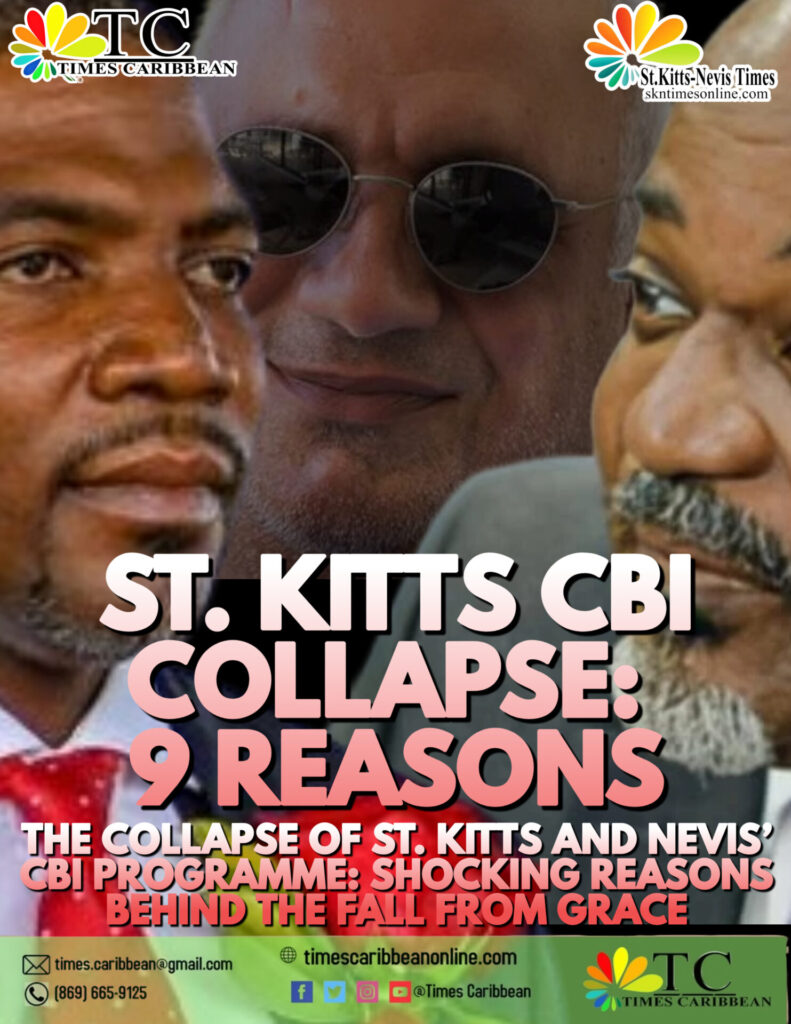THE COLLAPSE OF ST. KITTS AND NEVIS’ CBI PROGRAMME: SHOCKING REASONS BEHIND THE FALL FROM GRACE

“The Collapse of St. Kitts and Nevis’ CBI Programme: A Fall from Grace”
The Citizenship by Investment (CBI) programme of St. Kitts and Nevis, once heralded as the “platinum brand” in the region and around the world, has seen a dramatic decline in recent years. Once standing tall atop the CBI ladder, it now finds itself languishing at the bottom. The fall has been both swift and severe, with application volumes plummeting, tarnishing a programme that was once the envy of the Caribbean.
So, what caused this monumental collapse? Below are nine key reasons for the programme’s drastic downturn under the new administration of Prime Minister Dr. Terrance Drew.
1. Discrediting the Programme’s Legacy
One of the first actions taken by the new PM Drew-led administration was an attempt to discredit the successful management of the CBI programme under the previous leadership of Dr. Hon. Timothy Harris. Despite its unprecedented success, Drew’s administration sought to cast doubt on the integrity and efficiency of the programme, creating an atmosphere of uncertainty around it.
2. Firing the Most Successful CBI CEO
The new administration not only dismantled the management structure but also terminated the services of the region’s, and perhaps the world’s, most successful CBI CEO. This move destabilised the programme at a time when steady leadership was crucial to maintain its platinum status.
3. Inexperienced Leadership
In a surprising move, a party activist with limited experience in CBI operations was appointed to head the programme. This individual lacked the industry network and expertise that had been painstakingly built over the years. As a result, the programme had to essentially start from scratch in developing key relationships with potential investors and international partners.
4. Ill-Advised Price Hikes and Regulation Changes
The new management made a series of rapid and drastic changes, including doubling the price of CBI packages and imposing new regulations. These sudden moves alienated potential investors, who were turned off by the instability and the significantly higher costs. The programme, which had once thrived on its accessibility and value, now appeared overly restrictive and expensive.
5. Threats to Revoke Thousands of Passports
PM Drew’s public pronouncement that he would be willing to revoke thousands of passports if necessary sent shockwaves through the investor community. This created a sense of instability and insecurity, further discouraging potential clients from investing in a programme that now seemed politically volatile.
6. Appointment of Convicted Fraudster as Public Face
Another controversial decision was the appointment of Philippe Martinez, a convicted fraudster from France, as the face of the CBI programme. His designation as the sole public benefactor of the programme severely damaged its reputation, as investors were unwilling to associate with a programme linked to someone with a criminal record.
7. RICO Lawsuit and Legal Battles
The situation further deteriorated when Philippe Martinez, still the country’s CBI public benefactor, became embroiled in a RICO lawsuit. This lawsuit, coupled with the negative press surrounding Martinez’s involvement, only served to worsen the programme’s standing, driving away more potential investors.
8. DPP Inquiry into the Programme
Finally, the announcement by PM Drew of a formal inquiry by the Director of Public Prosecutions (DPP) into the CBI programme further damaged its image. The inquiry came on the heels of the programme’s collapse and created an even greater sense of instability and unpredictability, leaving the programme’s future hanging in the balance.
9. Political Weaponisation of the CBI Programme
It is clear that the Drew administration is using the CBI program as a weapon against it’s political opponents including their own minister of foreign affairs and former Prime Minister Dr Denzil Douglas. This kind of political maneuvering has scared away investors who need certainty and continuity. They have found Antigua and Barbuda and Grenada’s CBI programs to be stable, safer , better .
10. Misunderstanding the Essence of Rebranding
The rebranding effort needed to understand the process’s core principles. Rather than a holistic approach involving stakeholder input and building on past successes, it devolved into a hasty website redesign and wholesale rejection of previous work, seemingly driven by political motivations.
11. Disregarding Valuable Contributors
Key developers and stakeholders who had been instrumental in the program’s success were sidelined. The lack of genuine collaboration alienated these vital program stakeholders, depriving the project of their expertise and commitment.
11. Compromising Integrity Through Poor Vetting
A critical lapse in judgment occurred when an individual with a questionable background and potentially harmful intentions was allowed into a position of influence. This oversight jeopardized the project’s security and credibility.
The once-proud St. Kitts and Nevis CBI programme, which had set the gold standard for other countries in the region, has now been reduced to a shadow of its former self. A series of misguided decisions and questionable appointments have severely undermined the programme’s credibility, leading to its dramatic fall. The question remains: can the damage be repaired, or is this the end of St. Kitts and Nevis’ reign as the leader in the CBI world?

Leave a comment
You must be logged in to post a comment.